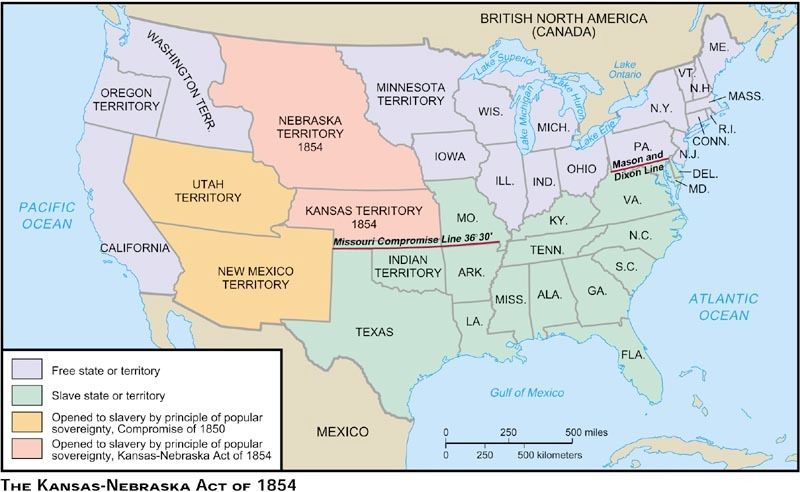
Posted on 01/01/2016 5:55:35 AM PST by Homer_J_Simpson

Happy New Year.
I promise there will be some actual 160-year-old information to present later on, but for now let us continue catching up on . . .
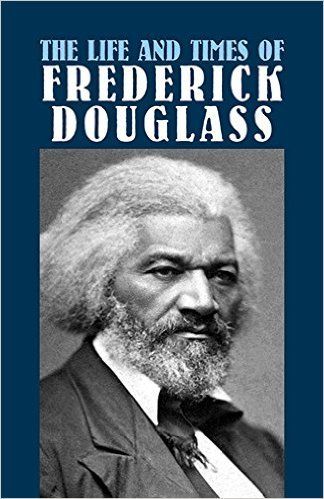
Continued from 1855 reply #371
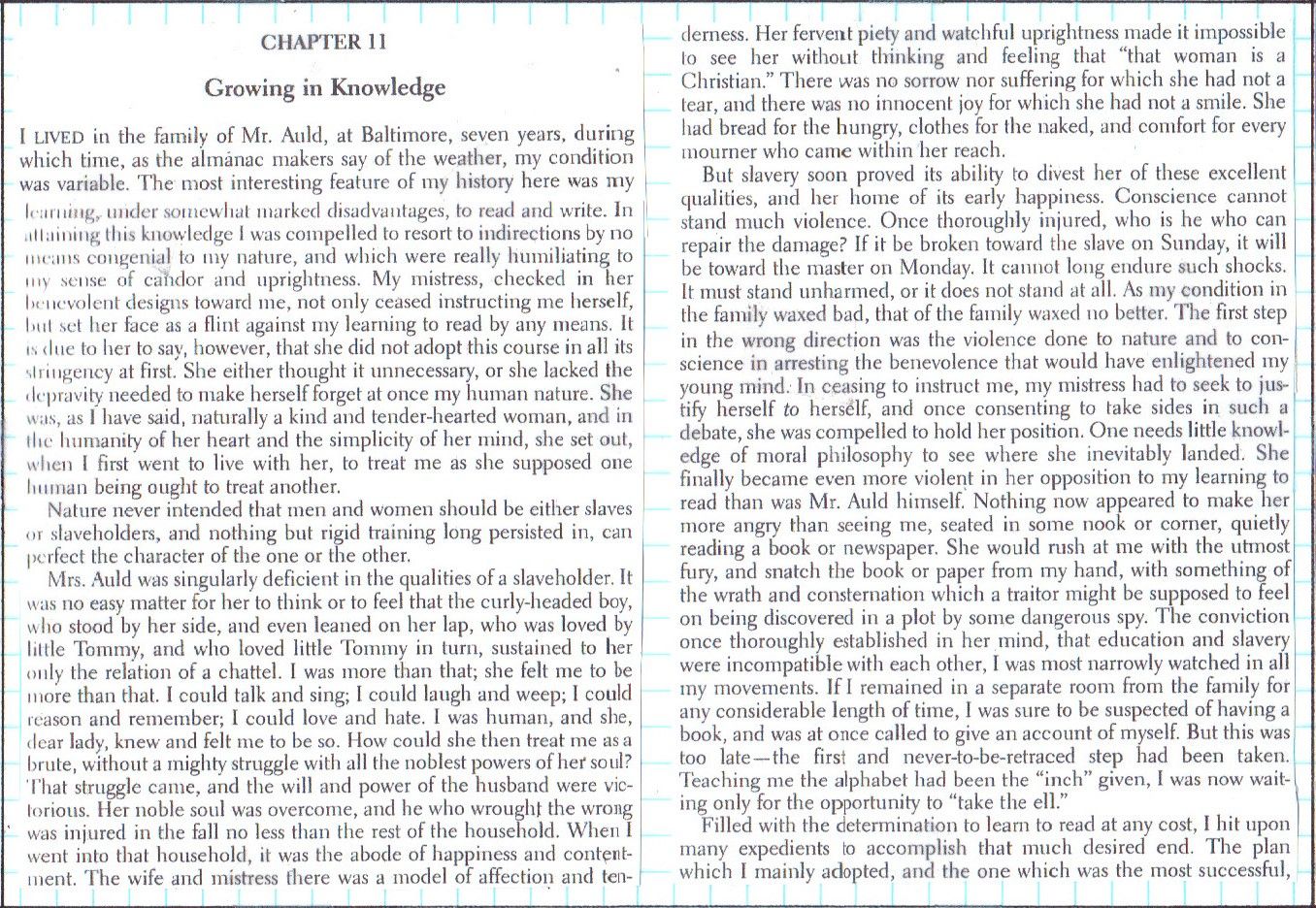
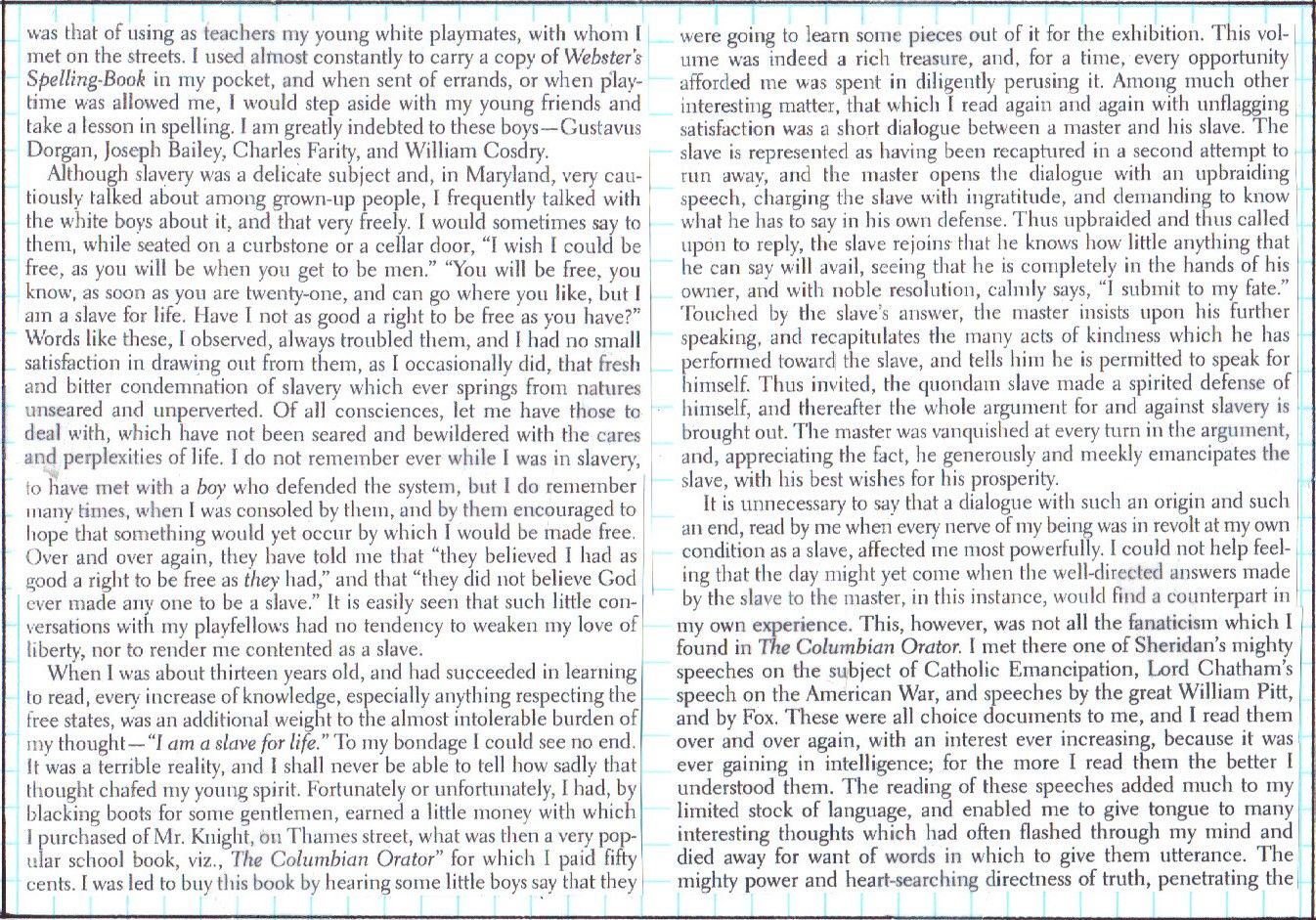
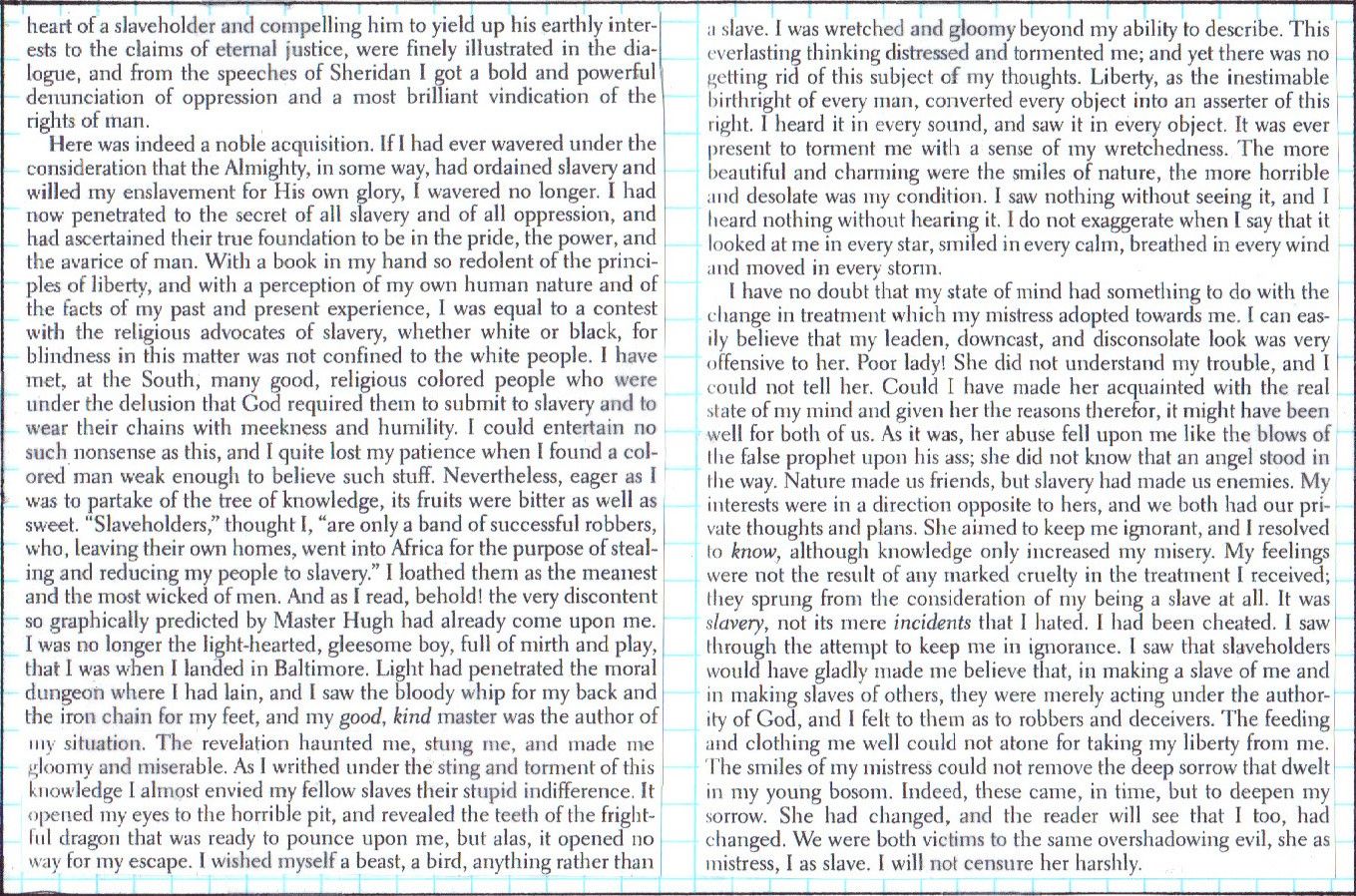
"The Life and Times of Frederick Douglass," by Frederick Douglass, (1892 edition)
bump for later
This is great. I am working on a post about the Dred Scott case for the near future and this debate touches on all the issues that made that case so important and controversial. Thanks for finding this link.
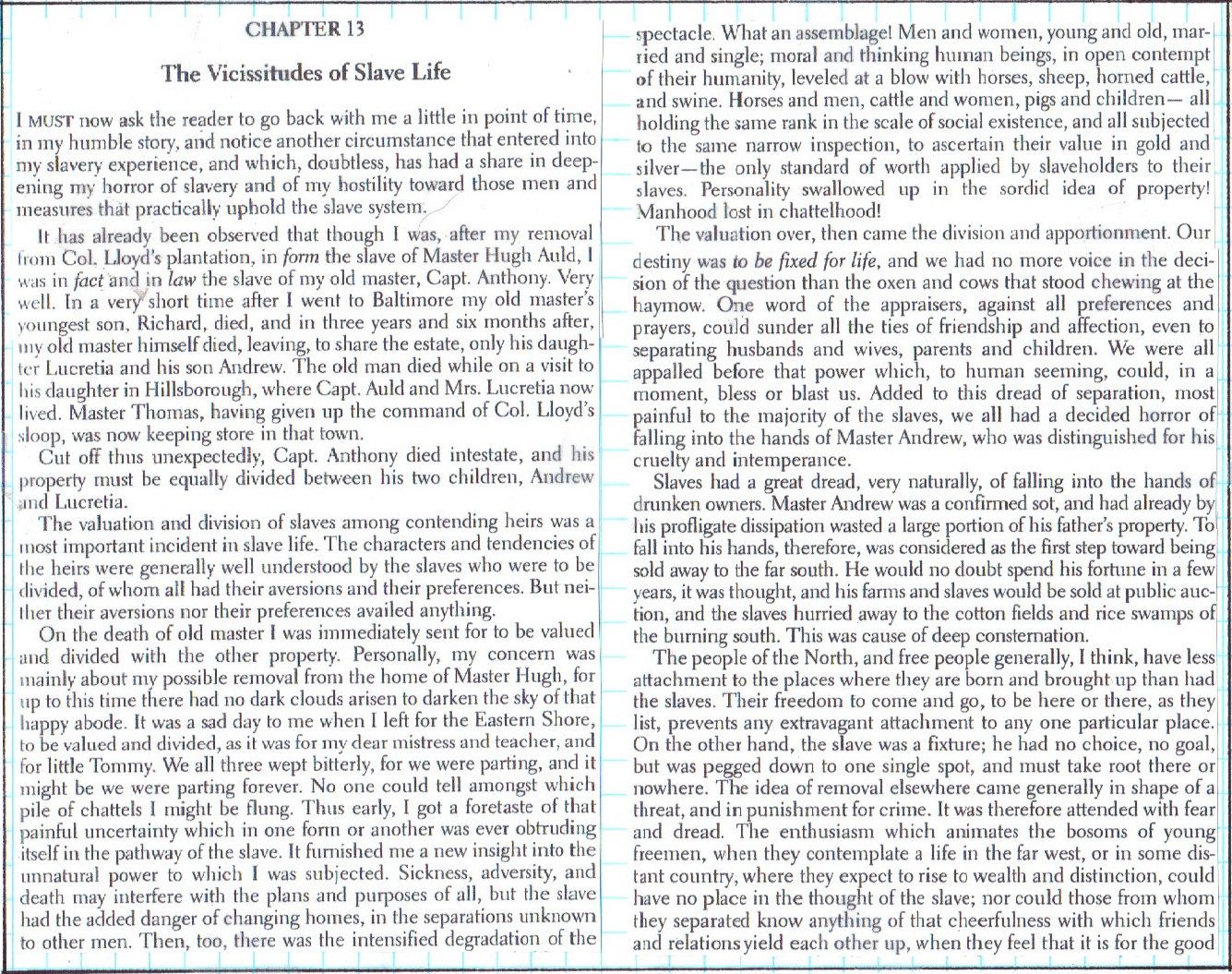
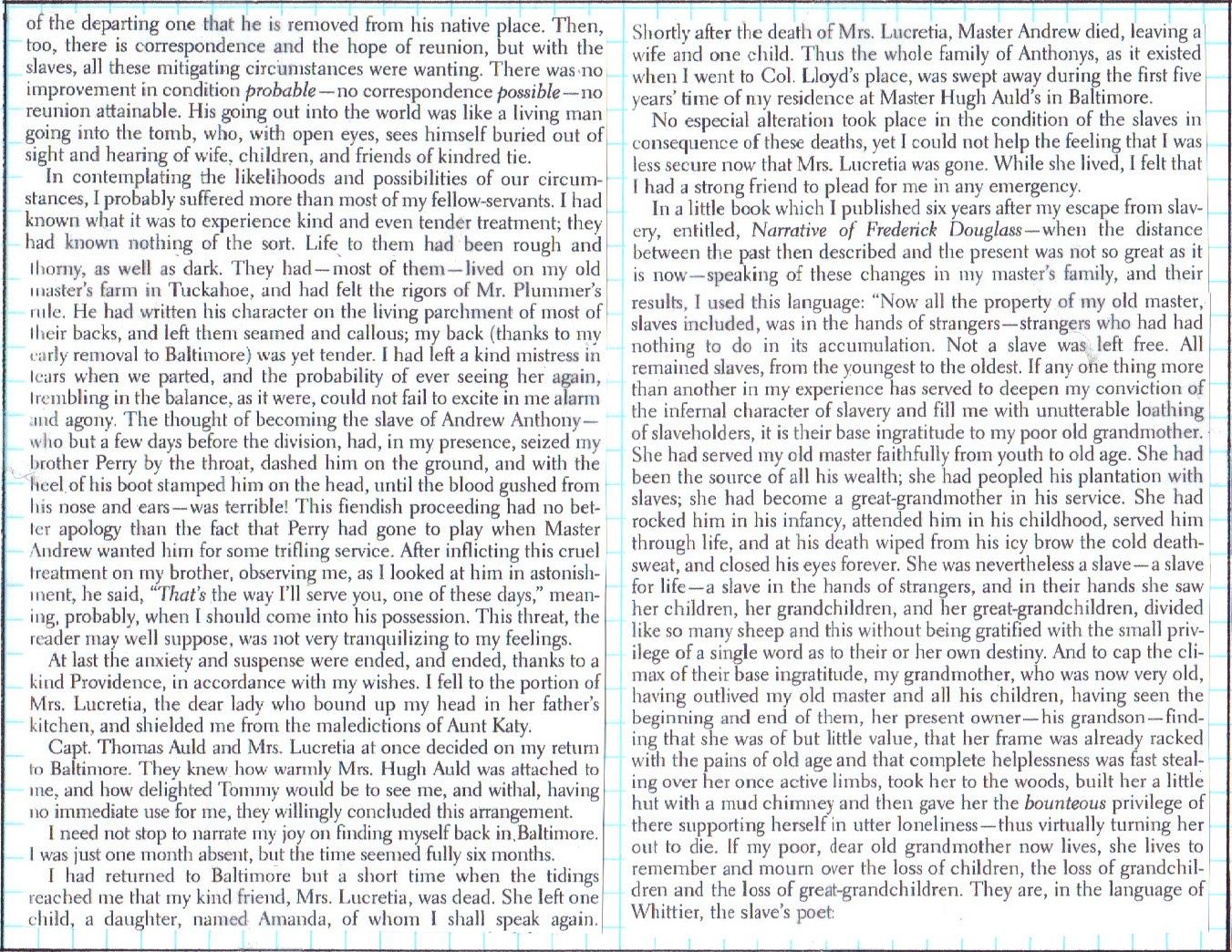
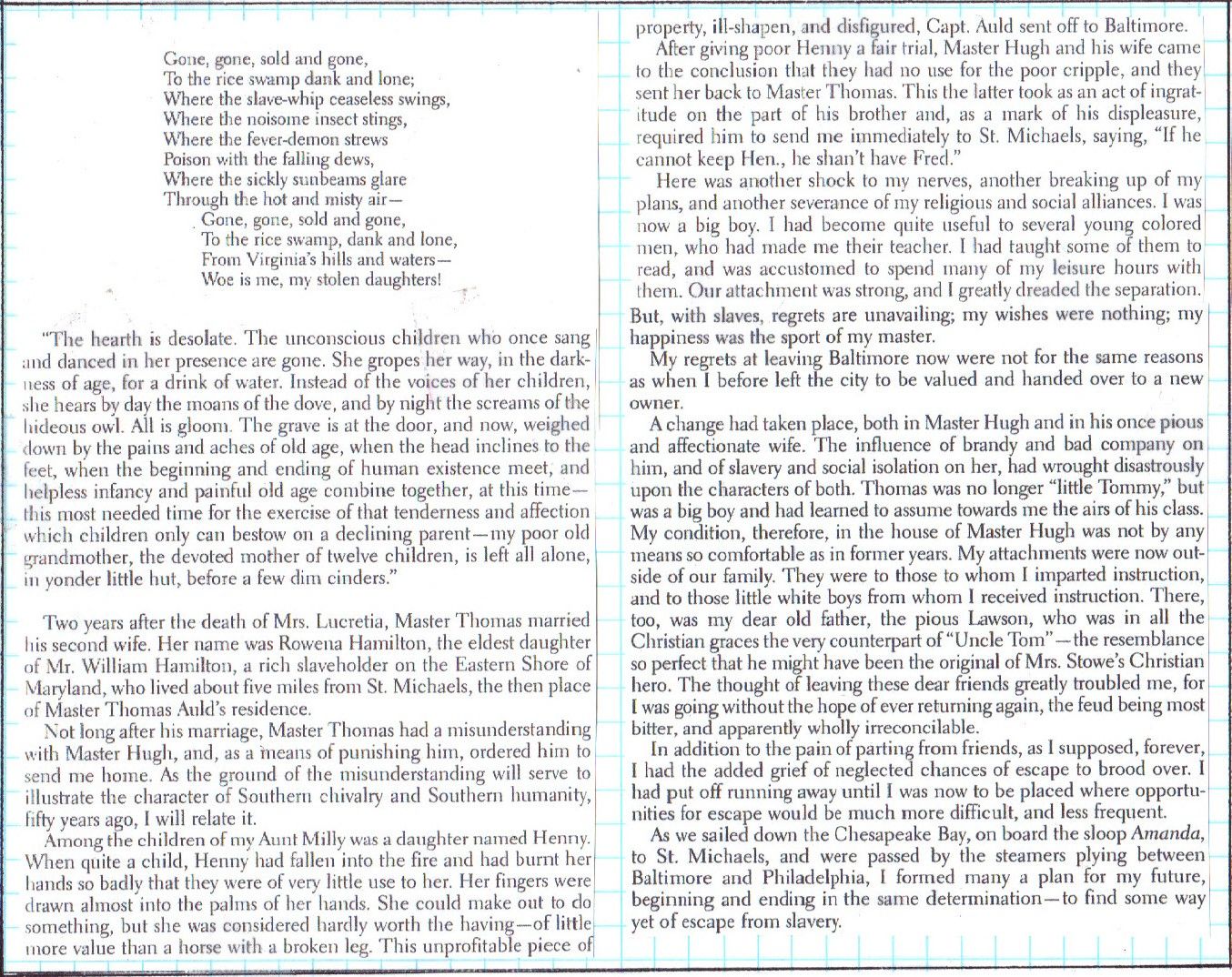
"The Life and Times of Frederick Douglass," by Frederick Douglass, (1892 edition)
“Knowledge makes a man unfit to be a slave.’
I reject the notion that slavery, especially Southern slavery, has been the worst of all possible human conditions.
DEFINE SLAVERY, help me out here.
What is the first image that comes into your mind when you see or hear it?
But what is the essence of slavery? It is common throughout history and will be here in the future.
From a Biblical perspective, you are slaves of sin, or slaves of God.
Imagine not having a clue who your father was, only having fleeting memories of your mother, and your entire life being able to be turned upside down or even ended on the whim or greed of another person know as your ‘Master”.
Tons of thoughts on that. You?
Not to in any way denigrate the horrors of the system of chattel slavery that we’re examining, there are many forms of slavery.
Starting of course with us being slaves to our own passions, and our own appetites, and our own sinful condition...a condition that can only be overcome in much the same way Frederick Douglass overcame his condition, which is by reading and appropriating in ourselves the truths contained in God’s Book.
In this sense it seems to me that the slaveholders themselves were slaves. Miserable ones at that, even in the lap of luxury.
In the bit of reading I’ve done on the subject I seem to recall that one of the points made by the abolitionists was that chattel slavery not only made wretches out of those who were held captive, but also hideously degraded those who held them captive.
I think this is true.
I think that those who are held in physical bondage can in fact be more free, in a very real sense, than those who possess the riches and power of the world.
Again, not to play down the horrors of chattel slavery. It is far better to be the wholly-free man that God intended us to be: physically, morally, intellectually, and most importantly, spiritually.
“Slaves had a great fear of falling into the hands of a drunken owner.”
These times were the beginning of many social changes of which slavery was only ONE aspect. It ended with national prohibition and then the decline began again...............
Christian Revival was a big part of what was going on in society and that also has to be discussed if we are going to understand the times.
system of chattel slavery
many forms
Another essence would be perpetual?
One of the unique aspects of American culture was the ability to move up and down social classes. I would suggest we have lost this in todays society.
Wikipedia: https://en.wikipedia.org/wiki/Slavery
Slavery is a legal or economic system in which principles of property law are applied to humans allowing them to be classified as property,[1] to be owned, bought and sold accordingly, and they cannot withdraw unilaterally from the arrangement. While a person is a slave, the owner is entitled to the productivity of the slave’s labour, without any remuneration. The rights and protection of the slave may be regulated by laws and customs in a particular time and place, and a person may become a slave from the time of their capture, purchase or birth.
Today, chattel slavery is unlawful in all countries, but a person may still be described as a slave if he or she is forced to work for another person without an ability on their part to unilaterally terminate the arrangement. Such situations are today commonly referred to as “practices similar to slavery”. The present form of the slave trade is commonly referred to as human trafficking.
Slavery existed before written history and in many cultures.[2] It was once institutionally recognized by most societies, but has now been outlawed in all countries,[3][4] the last being Mauritania in 2007. However, it continues through such practices as debt bondage, serfdom, domestic servants kept in captivity, certain adoptions in which children are forced to work as slaves, child soldiers, human trafficking and forced marriage.[5] Accordingly, there are still an estimated 20 million to 36 million slaves worldwide.[6][7][8]
The below gives a little overview of alcoholism but might give some insight. The use of morphine was common?
http://www.recoveryfirst.org/the-history-of-alcoholism-in-america/
Some bits of info here:
http://academics.lmu.edu/headsup/forstudents/historyofalcoholuse/
Early 19th Century
Development of the continuous still makes the process of alcohol distillation cheaper and easier to control.
1860
1,138 legal alcohol distilleries were operating in the United States producing 88 million gallons of liquor per year.
1862
Abraham Lincoln imposed a new tax on liquor (the Act of July 1) to help pay the bills from the Civil War. This act also created the office of internal revenue. The alcohol tax began at 20 cents per gallon in 1862 and had risen to $2.00 per gallon just over two years later.
1906
Pure Food and Drug Act is passed, regulating the labelling of products containing Alcohol, Opiates, Cocaine, and Cannabis, among others. The law went into effect Jan 1, 1907
Have you ever read any excerpts from Susan Brownmiller? Like I said before, lots of folks are pissed off about the circumstances of their lives.
You might read Three Months in the Southern States. It's not about slavery per se, but it does give a firsthand account by an Englishman, and so is free of the usual post-war, American biases.
Imagine not having a clue who your father was
I wouldn't go there if I were you. I wouldn't be surprised if a higher percentage of Southern slaves knew who their father was than do the children in Newark, NJ, today. (Which could be why Aristotle said what he did regarding this subject.)
ML/NJ
Imagine not having a clue who your father was
Personally, I am so glad my parents stayed together even though it was a hard marriage for them. It was one of the gifts they gave that I only appreciated in later life.
Marriage, parentage, family life, these are all the natural basis for legal property rights.
Slaveholders had to at least attempt to destroy God’s natural order of things, because to order things according to the natural law would be to destroy the corrupt foundations of the institution of slavery.
These questions have great relevance for us today, because we have many in power who are doing all they can to destroy marriage and the natural family.
If they are allowed to finish the job, marriage will NOT be the only casualty. Property rights, inheritance rights, liberty, republican self-government, all of these things will go onto the ash heap with it.
We and our children will find ourselves in a similar predicament to what Freddy found himself in.
It should also be pointed out that Marx and Ehgels admitted freely that communism could not be enacted in a society in which family life remained intact.
Well, of course, slavery is not the "worst of all possible human conditions."
Inmates in Hitler's Auschwitz or Stalin's gulag certainly had it worse than most American slaves, as do, for example ISIS' Christian captives today being beheaded or crucified.
Also, captives of ancient cannibalistic tribes were certainly worse off than America's African slaves.
But there is no normal human existence -- none -- which we would classify as "worse than slavery".
ml/nj: "I would much rather have been Thomas Jefferson's slave than to have been a coal miner in West Virginia."
Relative to other occupations, coal-mining was always a well-paid, if dangerous, job, which is why there were always plenty of volunteers to do such work.
Today the average coal-miner makes 2/3 more than average American wages, and Kansas coal miners average $113,000 per year.
Also, the American coal-mining industry (what's left of it) is among the safest in the world.
So there is no comparison -- zero, zip, nada -- between American African slavery and coal mining.
ml/nj: "I know it is not politically correct to say so but I believe the conventional revulsion concerning slavery stems from the North needing some sort of moral justification for the war that they perpetrated upon the South."
But "the North" perpetrated nothing on the South.
Rather, it was the Confederacy which first provoked war many times, then started war (at Fort Sumter), then formally declared war on the United States (May 6, 1861) and sent military aid to pro-Confederates fighting in Union Missouri.
When the Confederacy perpetrated existential threat on the United States it had to be defeated, unconditionally.
Of course, you know all that, because we've had this discussion before, but even when the truth slaps you in the face, you refuse to acknowledge it.
And that is because.... ??
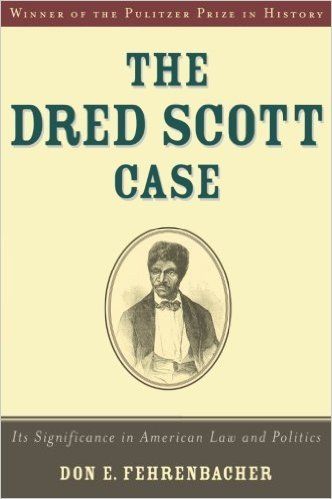
In anticipation of the 1857 delivery of the Dred Scott decision I wanted to learn what it was about. This book took care of that but also a whole lot more. A blurb on the back cover calls this book “probably the most thorough study of any Supreme Court decision ever undertaken.†I can’t confirm that but I wouldn’t be surprised if it is true. A lot of the value I got was background to the Dred Scott case. The first 235 pages are devoted to giving the reader sufficient information to understand the factors involved. Accordingly, slavery in America is examined from the delivery of the first African slaves to Jamestown in 1619, through the acknowledgement of slavery in the U.S. Constitution, and the problems of dealing with slavery during the expansion of the United States into new territories and states. That epic story takes 208 of those pages. Then follows a chapter on the Supreme Court that describes the evolution of judicial review from the English parliamentary model of the 17th century, through the era of the John Marshall court and up to our 160-year-old “present†at the time of Chief Justice Roger Taney.
Most of the details covered were new information to me. I might have learned about the broad concepts at different times during my government-supplied education but most of the important stuff in new to me. It was heavy going at times but I am quite glad I got the book and made the effort to read as far as I have. I plan to read it all over time. I should give a summary of the Scott case here to update those who are not familiar with it. The following all comes from the book.
Dred Scott was a slave owned by a Peter Blow, who moved from Alabama to St. Louis in 1830. Blow died in June 1832. Either Blow himself, before he died, or his estate, shortly after his death, sold Dred Scott to Dr. John Emerson of St. Louis. In December 1833 Emerson received a commission as an assistant surgeon in the U.S. Army and reported for duty at Fort Armstrong in Illinois, a free state. During his time at Fort Armstrong Emerson bought property across the Mississippi River in Iowa. Emerson improved the property, with Dred Scott probably doing much of the work. In 1836 Emerson was transferred to Fort Snelling in what is now Minnesota. That area was part of the Louisiana Purchase closed to slavery by the Missouri Compromise. There Scott met a slave girl named Harriet Robinson and they were married by a justice of the peace. Harriet’s owner either sold her to Emerson or gave her to Dred for a wife. The couple had 4 children, two of whom survived infancy and became parties in his eventual suit for freedom. In 1837 Emerson was ordered back to Jefferson Barracks in St. Louis. The Scotts apparently remained at Fort Snelling for a time. Emerson was ordered to Fort Jessup in Louisiana and arrived there in November 1837. In February 1838 Emerson married Eliza Irene Sanford. Emerson then sent for the Scotts and the couple travelled to Louisiana. By September 1838 the Emersons and their slaves travelled back to Ft. Snelling, arriving in October. Another traveler on the steamboat recorded that a daughter was born to the Scotts after they reached a point north of Missouri. That meant the child was born on free territory. In 1840 Emerson received orders to Florida. Mrs. Emerson and the Scotts remained in St. Louis when Emerson went to Florida. In 1842 Emerson was discharged from the army and returned to St. Louis. From there he went to Iowa, with the Scotts probably remaining in St. Louis. Emerson died in Iowa on December 29, 1843.
Emerson left his estate to his wife, Irene Sanford Emerson. One executor of the will was Mrs. Emerson’s brother, John F.A. Sanford. The administrator was her father, Alexander Sanford. The estate was settled by 1850 with Mrs. Emerson assuming full control.
On April 6, 1846, Dred and Harriet Scott filed petitions in the Missouri circuit court at St. Louis seeking to establish their right to freedom based on their residence on free soil. Under Missouri law they had a strong case. As Fehrenbacher says, “again and again, the highest curt of the state had ruled that a master who took his slave to reside in a state or territory where slavery was prohibited thereby emancipated him.†Unfortunately for the Scotts, their lawyer allowed a technical weakness in his case to sabotage the verdict. He didn’t provide a witness that could establish that Mrs. Emerson owned the Scotts, even though all concerned knew that to be the case. Because of that defect the verdict went against the Scotts. They filed a motion for a retrial, but the defendant filed something called a bill of exceptions and the case was sent to the supreme court of Missouri. It was not until March 22, 1852 that the state supreme court handed down a decision. The Scotts still had the facts on their side and probably would have prevailed except that the issue of slavery had become so heated in the nation by 1852 that the proslavery justices of Missouri were not disposed to give the anti-slavery side their way. The court ruled against the Scotts.
The next step for the case (formerly Scott v. Emerson, now Scott v. Sandford) was a U.S. circuit court, where on January 25, 1854 the case was “continued by consent, awaiting decision of Supreme Court of the United States.†After reviewing the chapter I am unable to explain why the case is called Scott v. Sandford when the newly designated defendant is named Sanford.
That is where the case sits in January 1856. For most of the nation the fate of a family of slaves is an afterthought compared to the enormous political stakes involved during this presidential election year. All of that is spelled out in “The Dred Scott Case: Its Significance in American Law and Politics.†I recommend the book for anyone who wants to learn about this matter that became so crucial to U.S. history. I consider it well worth the time I invested in reading it.
Two striking things about the debate, though: 1) Zolicoffer was a "Know Nothing" (American Party) Congressman. His family had come over from Switzerland in the 18th century, but a lot of Know Nothings voters must have been scratching their head about a nativist party candidate with a name like "Felix Zolicoffer". 2) If I understood what little I did read, Zolicoffer was actually more hardline pro-slavery than Alexander Stephens and opposed to any congressional action limiting slavery. He even served in the Confederate Army and was killed in action. But as I said, I didn't have time to read the whole record.
Zollicoffer was the first Confederate general to die in combat in the civil war. He died at a little known battle in Kentucky known as Mill Springs or Logan’s Crossroads, one of the Union’s first victories which helped keep Kentucky from joining the Confederacy.
http://www.millsprings.net/index.php/2013-10-01-18-24-22/battle-of-mill-springs
What a wonderful summary. Now I want to read the book “to see how it turns out.” I guess hating courts and lawyers goes back a long way into our history.
Disclaimer: Opinions posted on Free Republic are those of the individual posters and do not necessarily represent the opinion of Free Republic or its management. All materials posted herein are protected by copyright law and the exemption for fair use of copyrighted works.